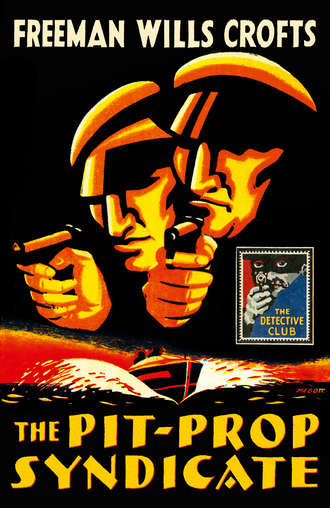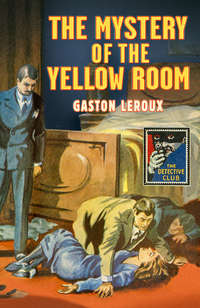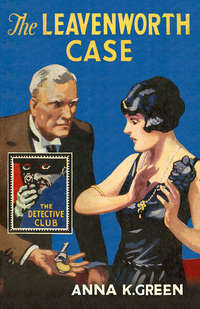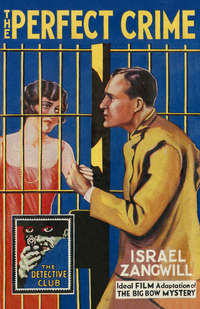
Полная версия
The Pit-Prop Syndicate
‘She carries between six and seven thousand props every trip,’ Mr Coburn told them, ‘that is, without any deck cargo. I dare say in summer we could put ten thousand on her if we tried, but she is rather shallow in the draught for it, and we don’t care to run any risks. Hallo, captain! Back again?’ he broke off, as a man in a blue pilot cloth coat and peaked cap emerged from below.
The newcomer was powerfully built and would have been tall, but for rather rounded shoulders and a stoop. He was clean shaven, with a heavy jaw and thin lips which were compressed into a narrow line. His expression was vindictive as well as somewhat crafty, and he looked a man who would not be turned from his purpose by nice points of morality or conscience.
Though Hilliard instinctively noted these details, they did not particularly excite his interest. But his interest was nevertheless keenly aroused. For he saw the man, as his gaze fell on himself and Merriman, give a sudden start, and then flash a quick, questioning glance at Mr Coburn. The action was momentary, but it was enough to bring back with a rush all Hilliard’s suspicions. Surely, he thought, there must be something if the sight of a stranger upsets all these people in this way.
But he had not time to ponder the problem. The captain instantly recovered himself, pulled off his cap to Miss Coburn and shook hands all round, Mr Coburn introducing the visitors.
‘Good trip, captain?’ the manager went on. ‘You’re ahead of schedule.’
‘Not so bad,’ the newcomer admitted in a voice and manner singularly cultivated for a man in his position. ‘We had a good wind behind us most of the way.’
They chatted for a few moments, then started on their tour of inspection. Though Hilliard was once again keenly on the alert, the examination, so far as he could see, left nothing to be desired. They visited every part of the vessel, from the forecastle storerooms to the tunnel of the screw shaft, and from the chart-house to the bottom of the hold, and every question either of the friends asked was replied to fully and without hesitation.
That evening, like the preceding, they passed with the Coburns. The captain and the engineer—a short, thick-set man named Bulla—strolled up with them and remained for dinner, but left shortly afterwards on the plea of matters to attend to on board. The friends stayed on, playing bridge, and it was late when they said good-night and set out to walk back to the launch.
During the intervals of play Hilliard’s mind had been busy with the mystery which he believed existed in connection with the syndicate, and he had decided that to try to satisfy his curiosity he would go down to the wharf that night and see if any interesting operations went on under cover of darkness. The idea of a midnight loading of contraband no longer appealed to his imagination, but vaguely he wished to make sure that no secret activities were in progress.
He was at least certain that none had taken place up to the present—that Mr Coburn was personally concerned in, at all events. From the moment they had first sighted the ship until they had left the manager’s house at the conclusion of the game of bridge, not five minutes ago, he had been in Mr Coburn’s company. Next day it was understood they were to meet again, so that if the manager wished to carry out any secret operations they could only be done during the night.
Accordingly when they reached the launch he turned to Merriman.
‘You go ahead, old man. I’m going to have a look round before turning in. Don’t wait up for me. Put out the light when you’ve done with it and leave the companion unlatched so that I can follow you in.’
Merriman grunted disapprovingly, but offered no further objection. He clambered on board the launch and disappeared below, while Hilliard, remaining in the collapsible boat, began to row silently up-stream towards the wharf.
The night was dark and still, but warm. The moon had not risen, and the sky was overcast, blotting out even the small light of the stars. There was a faint whisper of air currents among the trees, and the subdued murmur of the moving mass of water was punctuated by tiny splashes and gurgles as little eddies formed round the stem of the boat or wavelets broke against the banks. Hilliard’s eyes had by this time become accustomed to the gloom, and he could dimly distinguish the serrated line of the trees against the sky on either side of him, and later, the banks of the clearing, with the faint, ghostly radiance from the surface of the water.
He pulled on with swift, silent strokes, and presently the dark mass of the Girondin loomed in sight, with behind it the wharf and the shed. The ship, being longer than the wharf, projected for several feet above and below the latter. Hilliard turned his boat in-shore with the object of passing between the hull and the bank and so reaching the landing steps. But as he rounded the vessel’s stern he saw that her starboard side was lighted up, and he ceased rowing, sitting motionless and silently holding water, till the boat began to drift back into the obscurity down-stream. The wharf was above the level of his head, and he could only see, appearing over its edge, the tops of the piles of pit-props. These, as well as the end of the ship’s navigating bridge and the gangway, were illuminated by, he imagined, a lamp on the side of one of the deck-houses. But everything was very still, and the place seemed deserted.
Hilliard’s intention had been to land on the wharf and, crouching behind the props, await events. But now he doubted if he could reach his hiding place without coming within the radius of the lamp and so exposing himself to the view of any one who might be on the watch on board. He recollected that the port or river side of the ship was in darkness, and he thought it might therefore be better if he could get directly aboard there from the boat.
Having removed his shoes he rowed gently round the stern and examined the side for a possible way up. The ship being light forward was heavily down in the stern, and he found the lower deck was not more than six or seven feet above water level. It occurred to him that if he could get hold of the mooring rope pawls he might be able to climb aboard. But this after a number of trials he found impossible, as in the absence of some one at the oars to steady the boat, the latter always drifted away from the hull before he could grasp what he wanted.
He decided he must risk passing through the lighted area, and, having for the third time rowed round the stern, he brought the boat up as close to the hull as possible until he reached the wharf. Then passing in between the two rows of piles and feeling his way in the dark, he made the painter fast to a diagonal, so that the boat would lie hidden should any one examine the steps with a light. The hull lay touching the vertical piles, and Hilliard, edging along a waling to the front of the wharf, felt with his foot through the darkness for the stern belting. The tide was low and he found this was not more than a foot above the timber on which he stood. He could now see the deck light, an electric bulb on the side of the captain’s cabin, and it showed him the top of the taffrail some little distance above the level of his eyes. Taking his courage in both hands and stepping upon the belting, he succeeded in grasping the taffrail. In a moment he was over it and on the deck, and in another moment he had slipped round the deck-house and out of the light of the lamp. There he stopped, listening for an alarm, but the silence remained unbroken, and he believed he had been unobserved.
He recalled the construction of the ship. The lower deck, on which he was standing, ran across the stern and formed a narrow passage some forty feet long at each side of the central cabin. This cabin contained the galley and mess-room as well as the first officer’s quarters. Bulla’s state-room, Hilliard remembered, was down below beside the engine-room.
From the lower deck two ladders led to the bridge deck, at the forward end of which was situated the captain’s state-room. Aft of this building most of the remaining bridge deck was taken up by two lifeboats, canvas covered and housed in chogs. On the top of the captain’s cabin was the bridge and chart-house, reached by two ladders which passed up at either side of the cabin.
Hilliard, reconnoitring, crept round to the port side of the ship. The lower deck was in complete darkness, and he passed the range of cabins and silently ascended the steps to the deck above. Here also it was dark, but a faint light shone from the window of the captain’s cabin. Stealthily Hilliard tiptoed to the porthole. The glass was hooked back, but a curtain hung across the opening. Fortunately, it was not drawn quite tight to one side, and he found that by leaning up against the bridge ladder he could see into the interior. A glance showed him that the room was empty.
As he paused irresolutely, wondering what he should do next, he heard a door open. There was a step on the deck below, and the door slammed sharply. Some one was coming to the ladder at the top of which he stood.
Like a shadow Hilliard slipped aft and, as he heard the unknown ascending the steps, he looked round for cover. The starboard boat and a narrow strip of deck were lighted up, but the port boat was in shadow. He could distinguish it merely as a dark blot on the sky. Recognising that he must be hidden should the port deck light be turned on, he reached the boat, felt his way round the stern, and, crouching down, crept as far underneath it as he could. There he remained motionless.
The newcomer began slowly to pace the deck, and the aroma of a good cigar floated in the still air. Up and down he walked with leisurely, unhurried footsteps. He kept to the dark side of the ship, and Hilliard, though he caught glimpses of the red point of the cigar each time the other reached the stern, could not tell who he was.
Presently other footsteps announced the approach of a second individual, and in a moment Hilliard heard the captain’s voice.
‘Where are you, Bulla?’
‘Here,’ came in the engineer’s voice from the first-comer.
The captain approached and the two men fell to pacing up and down, talking in low tones. Hilliard could catch the words when the speakers were near the stern, but lost them when they went forward to the break of the poop.
‘Confound that man Coburn,’ he heard Captain Beamish mutter. ‘What on earth is keeping him all this time?’
‘The young visitors, doubtless,’ rumbled Bulla with a fat chuckle; ‘our friends of the evening.’
‘Yes, confound them too,’ growled Beamish, who seemed to be in an unenviable frame of mind. ‘Damned nuisance their coming round. I should like to know what they are after.’
‘Nothing particular, I should fancy. Probably out doing some kind of holiday.’
They passed round the deck-house and Hilliard could not hear the reply. When they returned Captain Beamish was speaking.
‘—thinks it would about double our profits,’ Hilliard heard him say. ‘He suggests a second depot on the other side, say at Swansea. That would look all right on account of the South Wales coalfields.’
‘But we’re getting all we can out of the old hooker as it is,’ Bulla objected. ‘I don’t see how she could do another trip.’
‘Archer suggests a second boat.’
‘Oh.’ The engineer paused, then went on: ‘But that’s no new suggestion. That was proposed before ever the thing was started.’
‘I know, but the circumstances have changed. Now we should—’
Again they passed out of earshot, and Hilliard took the opportunity to stretch his somewhat cramped limbs. He was considerably interested by what he had heard. The phrase Captain Beamish had used in reference to the proposed depot at Swansea—‘it would look all right on account of the coalfields’—was suggestive. Surely that was meaningless unless there was some secret activity—unless the pit-prop trade was only a blind to cover some more lucrative and probably more sinister undertaking? At first sight it seemed so, but he had not time to think it out then. The men were returning.
Bulla was speaking this time, and Hilliard soon found he was telling a somewhat improper story. As the two men disappeared round the deck-house he heard their hoarse laughter ring out. Then the captain cried: ‘That you, Coburn?’ the murmur of voices grew louder and more confused and immediately sank. A door opened, then closed, and once more silence reigned.
To Hilliard it seemed that here was a chance which he must not miss. Coming out from his hiding place, he crept stealthily along the deck in the hope that he might find out where the men had gone, and learn something from their conversation.
The captain’s cabin was the probable meeting place, and Hilliard slipped silently back to the window through which he had glanced before. As he approached he heard a murmur of voices, and he cautiously leaned back against the bridge ladder and peeped in round the partly open curtain.
Three of the four seats the room contained were now occupied. The captain, engineer and Mr Coburn sat round the central table, which bore a bottle of whisky, a soda syphon and glasses, as well as a box of cigars. The men seemed preoccupied and a little anxious. The captain was speaking.
‘And have you found out anything about them?’ he asked Mr Coburn.
‘Only what I have been able to pick up from their own conversation,’ the manager answered. ‘I wrote Morton asking him to make inquiries about them, but of course there hasn’t been time yet for a reply. From their own showing one of them is Seymour Merriman, junior partner of Edwards & Merriman, Gracechurch Street, Wine Merchants. That’s the dark, square-faced one—the one who was here before. The other is a man called Hilliard. He is a clever fellow, and holds a good position in the Customs Department. He has had this launch for some years, and apparently has done the same kind of trip through the Continental rivers on previous holidays. But I could not find out whether Merriman had ever accompanied him before.’
‘But you don’t think they smell a rat?’
Mr Coburn hesitated.
‘I don’t think so,’ he said slowly, ‘but I’m not at all sure. Merriman, we believe, noticed the number plate that day. I told you, you remember. Henri is sure that he did, and Madeleine thinks so too. It’s just a little queer his coming back. But I’ll swear they’ve seen nothing suspicious this time.’
‘You can’t yourself account for his coming back?’
Again Mr Coburn hesitated.
‘Not with any certainty,’ he said at last, then with a grimace he continued: ‘But I’m a little afraid that it’s perhaps Madeleine.’
Bulla, the engineer, made a sudden gesture.
‘I thought so,’ he exclaimed. ‘Even in the little I saw of them this evening I thought there was something in the wind. I guess that accounts for the whole thing. What do you say, skipper?’
Конец ознакомительного фрагмента.
Текст предоставлен ООО «ЛитРес».
Прочитайте эту книгу целиком, купив полную легальную версию на ЛитРес.
Безопасно оплатить книгу можно банковской картой Visa, MasterCard, Maestro, со счета мобильного телефона, с платежного терминала, в салоне МТС или Связной, через PayPal, WebMoney, Яндекс.Деньги, QIWI Кошелек, бонусными картами или другим удобным Вам способом.






